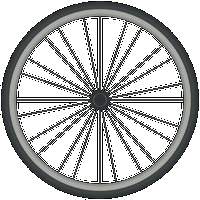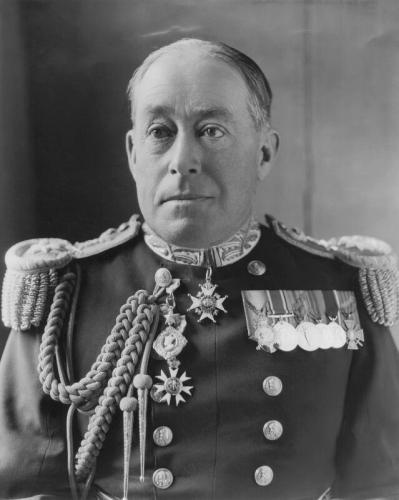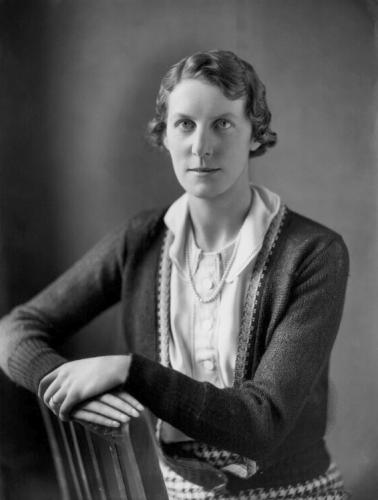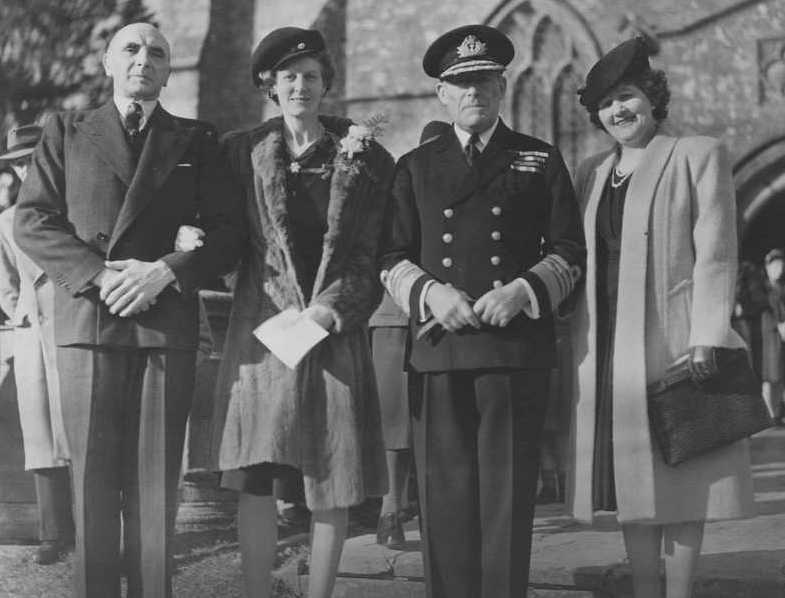Admiral Sir Dudley Burton Napier North K.C.V.O; C.B; C.S.I.; C.M.G was probably Netherbury’s most highly decorated resident.
As an Admiral he outranked Vice-Admiral Sir Samuel Hood of Kingsland who is memorialised with a brass plaque in St Mary’s church. He rose through the ranks of the Royal Navy to become Flag Officer Commanding, North Atlantic, a couple of months after the outbreak of World War Two.
When he moved to Netherbury with his wife and four children in the summer of 1941 it wasn’t generally known that he’d been relieved of his command and forced to “haul down his flag” from his headquarters on Gibraltar.
He felt he’d been the victim of a great injustice and would spend the period he lived in Netherbury trying to correct it. However, with the war still being fought, North did so privately only mounting a public campaign once it was over.
Born in November 1881 he was the son of a lieutenant-colonel in the Royal Artillery who died in Myanmar (then called Burma) when Dudley was 16. His four brothers all went into the Army but Dudley joined the Royal Navy and began his climb through the ranks. His Service Record says he entered the service in January 1896 when he would have been just 14 years old. Seven years later he was promoted to Lieutenant.
In 1909, while he was serving on HMS Powerful, North married Eglantine Susan Elizabeth Campbell in Sydney, Australia. The Sydney Daily Telegraph describes the outfits worn by the bride, bridesmaids, the bride’s mother and several other female guests in fine detail. It also tells us that the Best Man was Lieutenant Guy Fanshawe, a shipmate of North’s from HMS Powerful. Unfortunately there is no information about how or when the couple met.
Eglantine moved to England and the 1911 census lists them living in Devonport, Plymouth, with a cook and parlour maid. Later they moved to Kensington, London, which is where, sadly, Eglantine died of pernicious anaemia in 1917.
North would eventually remarry but he apparently kept a photograph of Eglantine on his desk, even after his second marriage. Children soon followed including three daughters the second of which, Mary, was given Eglantine as her middle name. The other two were called Susan and Elizabeth - Eglantine’s middle names.
Six months into World War 1, on the last day of 1914, Dudley had been made a Commander. He saw action in the naval battles of Heligoland Bight, Dogger Bank and Jutland. After the war he was promoted to Captain on the last day of 1919.
During the period before and during WW1 North served alongside and became acquainted with some people he probably would not have met in other circumstances. The first were a pair of brothers – George and Louis Battenberg. Although the Battenberg family had been living in Britain for years and several members of it were fighting against Germany in the Royal Navy it was felt that Battenberg was too German and the public’s animosity to anything German meant they changed their name to Mountbatten in 1917.
Louis Mountbatten would go on to become The Right Honourable, Earl Mountbatten of Burma. He was Viceroy of India and its first Governor-General after Independence as well as being an uncle of Prince Phillip who would marry Queen Elizabeth II.
North also met a young man who was apparently known as Mr Johnson but was in fact Prince Albert Frederick Arthur George who would unexpectedly become King George VI.
After the war North became a naval equerry to “Mr Johnson’s” older brother who was by then The Prince of Wales and would become King Edward VIII for a little less than a year, before abdicating.
North accompanied the Prince on four diplomatically important Royal Tours visiting many countries and establishing lasting connections with several members of the Royal Family.
In 1923 he met and then married his second wife, Eilean Graham, the daughter of a Harrow schoolmaster. She, at 22 years old, was 20 years younger than North. They married in Charminster, a couple of miles outside Dorchester, and Lord Louis Mountbatten was amongst the guests.
Within a few months Dudley was posted to Gibraltar where he was joined by his already pregnant wife Eilean. Their first child, Susan, was subsequently born back in England with the Prince of Wales as her Godfather. The family then established a home in Warblington, Hampshire, where it expanded with the addition of three more children – Roger, Mary & Elizabeth.
In July 1932 Dudley was promoted to Rear Admiral and by the end of 1934 he was Flag Officer Commanding, Royal Yachts. With WW2 approaching he was made a Vice Admiral in June 1936 and a full Admiral in May 1940, nine months after the start of war.
North was made Flag Officer Commanding, North Atlantic on 1st Nov 1939 just two months into the war. He was to be based in Gibraltar from where the allies would aim to control all shipping in and out of the Mediterranean Sea. When the Germans invaded France and a nominally neutral French government was set-up at Vichy in June 1940 Gibraltar became even more important as it meant the bulk of the French navy, and that of Germany’s ally Italy, were effectively bottled up in the Mediterranean.
It was felt by many that much of the French Navy, who until then had been fighting alongside Britain and its allies, would be reluctant to switch sides. This wasn’t enough to satisfy the Admiralty in London who ordered North to demand that their ships be handed over to the British Navy so they could be taken to ports in the UK. This was a step too far for the French, already feeling humiliated by the capitulation of their army and government, and they refused whilst promising they’d scupper their fleet rather than let it fall into German hands.
This reassurance did not convince the Admiralty and they launched an operation, which didn’t include North, with the objective of seizing control of the French ships in the port of Mers-el-Kebir (Oran) in Algeria on the North African coast or, if that was not possible, to sink them.
The French Admirals were not prepared to hand over the fleet and so an attack was launched which resulted in the loss of 1,279 French lives, 351 wounded and severely damaged any lingering camaraderie between the two navies.
Admiral North, back in Gibraltar, sent a message to The Admiralty in London which was highly critical of the operation. This was not well received and almost certainly counted against him later on.
In order to avoid further inflaming relations with the French navy North was given orders “to take no further action against French ships in French colonial or North Africa ports” although HM Government reserved the right “to take action in regard to French warships proceeding to enemy controlled ports”.
A few months later the Admiralty launched an operation to seize Dakar in Senegal on the West coast of Africa from French “Vichy” control and install General De Gaulle and a force of Free French fighters. The plan had the strong support of Winston Churchill and General De Gaulle but Admiral North was not involved or officially informed about it.
In the meantime a force of six French cruisers sailed from Toulon towards the Straits of Gibraltar. Admiral North had intelligence that suggested they were probably attempting to avoid coming under direct German control and heading for “Vichy” French Casablanca in Morocco, on the NW African coast.
He sent signals to the Admiralty but got no replies and, as the only force he had that could have intervened was heavily out gunned by the French cruisers, North decided to obey the orders he already had and let them through to the Atlantic.
The raid on Dakar was a disaster. The French cruisers were under orders to call in at Casablanca, pick up rations to be delivered to Dakar and then head on South to Pointe Noire in French Equatorial Africa (Rep. of the Congo). Whilst in Casablanca they received reports of a large allied fleet approaching and, probably fearing another attack as had happened at Mers-el-Kebir, they quickly left port and headed south. They ended up arriving at Dakar before the Allied fleet although it isn’t thought they played a large part in its defence.
The Allied raid on Dakar failed mainly because the Vichy forces didn’t capitulate or go over to the Free French side as had been anticipated and, after three days, the operation was called off.
It had been badly conceived, chaotically prepared and poorly carried out. It was reported in the American press as a colossal blunder and both Churchill, the British Prime Minister, and De Gaulle, the leader of the Free French, were personally associated with it. A scapegoat was needed to deflect the blame and that turned out to be Admiral Sir Dudley North.
He was told that the naval commanders no longer had confidence in him and that when he’d had no response to his signals about the French cruisers leaving the Mediterranean he should have disobeyed the orders he’d been given previously and stopped them. He was relieved of command on Gibraltar and ordered to “haul down his flag” and return to Britain. By the end of the year he was back with his family and unemployed.
Before the war the Norths had been living at Warblington Castle near to Portsmouth in Hampshire. Six months after his return they bought Stonehouse in the centre of Netherbury and started what would be a fourteen year residency in the village. Soon after arriving the Admiral enlisted in the local Home Guard as a private but, according to Lady North, he was made up to major within a fortnight.
His attempts to be granted an inquiry or court martial so that he could clear his name continued with the support of many who’d been under his command as well as his peers in the navy, peers of the realm, members of Parliament and members of the Royal Household but all with no success.
When the war was still being fought he kept his entreaties private but once it was over he felt able to be more public. A legal case was launched, questions were asked in the House of Commons and there was a debate in the House of Lords. Five Admirals of the Fleet wrote to the First Sea Lord supporting his cause. It is thought Earl Mountbatten and even King George VI promoted his case behind the scenes. War historians published books and a great many journalists wrote articles.
A search of the British Newspaper Archive looking for articles containing all the words Admiral, Dudley & North, published between the end of WW2 and 24th May 1957 (when PM Macmillan made a statement to the House of Commons), results in 8,312 hits. Not every article is in connection with his campaign for justice but, apart from a few about his daughters’ marriages and some covering fete openings and the like, the vast majority are.
Although his campaign for justice absorbed Admiral North, life carried on for Lady Eilean and their children. In January of 1946 Susan, their first born and by then 22 year old daughter, married Basil A. Watts at Netherbury.
In February of 1949, at the age of 18, their second daughter Mary travelled to Denmark to start a job as governess to the King of Denmark’s three daughters. It’s unclear what qualified her for the role but it’s presumed that her family’s links with the British Royal Family may have played a part. One of her duties was to teach the English language to the princesses the eldest of whom, Margrethe, would go on to be Queen of Denmark.
In 1952 the North’s youngest daughter, Elizabeth, married David Howard. They had four children but later divorced. Towards the end of the 1960s she went to Leeds University as a mature student. She studied English and philosophy, began writing and went on to publish several, often semi-autobiographical, novels.
On 26th July, 1954 Lord Winster opened a debate in the House of Lords asking Her Majesty's Government “What were the circumstances in which Admiral Sir Dudley North was ordered to haul down his flag when Admiral Commanding the North Atlantic and the reasons why this officer has been denied the inquiry into his conduct which he has repeatedly requested?”
Winster was a supporter of Admiral North. He had been an insider at the Admiralty working for A.V. Alexander, First Lord of The Admiralty, at the time of North’s sacking and had long felt that he’d been badly treated.
The debate went on for over three hours and meant that the facts of the case were fully aired in public and recorded in Hansard for all to see.
A couple of weeks after the Lords debate it was announced that Mary North, still working as a Governess to the Danish princesses was engaged to be married to Mr. Mogen Harttung, an aircraft salesman “who represents a British firm which has sold Denmark many jet fighters”.
When the wedding went ahead in October of 1954 it was reported widely in the UK press, principally because the three princesses were amongst the five bridesmaids. After the wedding there was a Royal reception at which the King toasted the couple. Admiral and Lady North brought the wedding cake with them from England, another fact that was widely reported.
The next day it was less widely reported that, whilst the Norths had been at the ceremony in Denmark, somebody had used a ladder to gain entry to their house in Netherbury via an upstairs window and made off with “jewellery and silver worth several thousand pounds”. It hasn’t been possible to find any reports of someone being apprehended in connection with the burglary.
In 1955 Admiral and Lady North, with their children now grown up, no longer needed a home the size of Stonehouse and they moved to a property just outside Netherbury’s parish boundary. Parnham Lodge had been the gatehouse to Parnham House and it was here that North now waited, in failing health, for his vindication.
Whilst he never got the inquiry or court martial that he’d always wanted on 24th May, 1957 Harold Macmillan, who was then Prime Minister, read out a statement in the House of Commons which started
“Mr. Speaker, with permission I will now make a statement on the question raised by several hon. Members regarding the circumstances which led to Admiral Sir Dudley North's relief as Flag Officer, North Atlantic, in 1940.”
Whilst continuing to rule out any possibility of an inquiry he went on to say
“A careful examination of the records has led me to the conclusion that, so far as concerned the passing of the French ships through the Straits of Gibraltar, Admiral North cannot be accused of any dereliction of duty. He obeyed his orders as he interpreted them and some blame must rest on the fact that they were not drawn with complete clarity.”
This statement seems to have pretty much drawn a line under the affair although it never really satisfied Admiral North. He died almost exactly four years later at Herrison House, Dorchester.
As well as the usual sources the book "A matter of expediency - The jettison of Admiral Sir Dudley North" by Charlotte and Denis Plimmer, 1978. ISBN 0 7043 2169 6 was used extensively in the research for this page.
.




